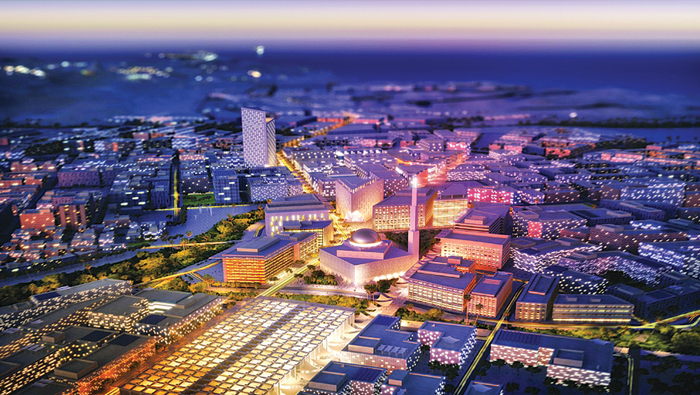
Duqm: Some 13 massive construction projects are currently underway in Duqm, as the Sultanate looks to accelerate its transition to a successful and sustainable non-oil future.
These include building and upgrading the road networks that will connect the fledgling city to Muscat and Salalah as well as the setting up of a sprawling fisheries port, as Oman looks to harness its natural wealth.
Plans to set up a central business district – the financial heart of the city – have also been drawn up and are currently underway.
A total of 13 tenders towards the construction and upgrading of road services and public amenities were awarded by the Special Economic Zone Authority of Duqm (SEZAD) in 2018. These include five road laying projects, including the setting up a dual carriageway, as well as a road that will connect Duqm Airport to Ras Markaz, which will contain a crude oil storage terminal, 70km south of Duqm proper, at a cost of $4.6 billion (OMR1.77 billion).
Reggy Vermeulen, CEO of the Port of Duqm, said the current expansion plans in Duqm would enable the port and other logistics companies to handle any kind of commodity, many of which are crucial to the GCC and the rest of the region.
“We have a very close relationship with SEZAD, in that we have a couple of packages, which are the commercial quay, the gates and the liquid jetty system, all of which are now being constructed, and are actually nearing completion,” said Vermeulen. “The big role of the Port of Duqm is to work with SEZAD in finalising these packages, and then get ready to start equipping these areas with the proper loading and unloading of equipment to start the operation of ships, so that’s where we come very closely after SEZAD. Once they finish the construction package, then we take up operations.”
“The Port of Duqm is gigantic, but our first major milestone will be in early 2020, which is when we will start the operation of these packages,” he added.
“Once that is done, at that moment, we will be capable of receiving, as well as loading and unloading any type of cargo in the Port of Duqm, and after that, it will be mainly expansion based on the needs of the zone and the country rather than any new offerings to the market.”
Separate tenders were also awarded for an automated street lighting system, as well as to operate and maintain traffic signals, while Duqm’s rock garden will also receive better access, with a new road set-up expected there as well.
Another tender for the setting up of a sewage treatment plant to meet the needs of the future inhabitants of the city was also issued.
Construction of Duqm’s new fishery port’s onshore facilities and other integral infrastructure has also begun, parallel to the earthworks happening at the Port of Duqm’s Logistics Area, with this particular phase of construction being spread over 5.5 hectares.
The new SEZAD offices in Duqm are also up and running, providing a one-stop shop for businesses that want to set up operations in Duqm.
“Duqm Port has become a beehive with the construction of the remaining packages, such as the preparation of the commercial berth for handling of containers and the construction of the oil berth that prepares the port for the export of refined petroleum products,” said Yahya bin Said Al Jabri, General Supervisor of SEZAD.
“The Special Economic Zone of Duqm (SEZD) is also witnessing the construction of the fishery harbour and the implementation of several main and secondary roads that join the various parts of SEZD.”
“Duqm Refinery, whose construction tenders of 230,000 barrels per day were awarded in recent months, is a major project that qualifies Duqm as one of the major petrochemical industries zones in the Gulf and Indian Ocean region,” he added.
“The diversity of investments and investors is key to the establishment of the modern city of Duqm based on the coexistence of all members of society and meets their needs and requirements through a wide range of services provided in the coming period by the local and global private sectors.”
Al Jabri added, “Coupled with the interest in promoting Duqm is the quick pace for completing the infrastructure in SEZD. In September, the commercial operation of the terminal building at Duqm Airport was an important development that brought Duqm closer to Muscat and facilitated the movement between them. We look forward to seeing the full operation of the airport both locally and internationally in the coming few years.”
Located some 550km from Muscat and 600km from Salalah, Duqm is located on the open Arabian Sea, making it a strategic location for ships that drop off vital cargo and supplies, which can then be shipped from Duqm to the rest of the GCC and the Middle East. Currently, most trade ships that drop off supplies at GCC ports pass through the Strait of Hormuz, which is jointly controlled by Oman and Iran, and located just beyond the Sultanate’s northern Governorate of Musandam.
At present, about 20% of the world’s petroleum – 35% of petroleum traded by sea – passes through the Strait of Hormuz, but Vermeulen is hoping Duqm’s presence on the open Arabian Sea will reduce the amount of pressure on this choke point.
“It goes beyond only SEZAD, it goes to the Al Wusta region, towards oil and gas, and in some cases, even to the Dhofar region and the north of the country,” he said.
“There are some cargoes that can only be received at the Port of Duqm, because this is oversized cargo.”